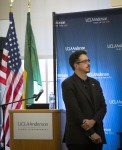This post was updated Nov. 14 at 1:20 p.m.
The Brazilian minister of culture said artists and innovators are the professionals and backbone of the new creative economy at an event on campus Thursday.
Minister Sérgio Sá Leitão talked about the growth of Brazil’s creative economy at an event hosted by the Latin American Business Association, Center for Global Management, the Center for Brazilian Studies, the Department of Spanish & Portuguese, and the Consulate General Of Brazil in Los Angeles. A creative economy focuses on the creation and management of intellectual property and creative ideas as opposed to physical commodities, Leitão said.
Luiza Niemeyer, a graduate student at the UCLA Anderson School of Management who organized the lecture, said in an email statement that she put together the event because she thinks Los Angeles has the potential to also develop a creative economy.
“This is an interesting topic that has to do with Los Angeles and its entertainment scene,” she said. “When I heard that the minister was coming to Los Angeles, I thus quickly connected the dots and invited him to come to campus.”
Leitão said the Brazilian Ministry of Culture was able to channel the cultural diversity of the country into the development of their economy. This resulted in a transition from a commodity-based economy to one based on knowledge and creativity, he said.
“We are not only managing to promote creative economy as a whole, but we are aiming to reduce the inequalities within Brazilian society by opening up opportunity to (the disadvantaged),” he said. “We have this obligation to provide opportunities for these people in order for them to have the tools to build their own destinies.”
Leitão said he thinks Brazil’s creative economy has proven that cultural growth is essential to Brazil’s economic future.
“In just the last five years, there has been 9.1 percent growth in the creative industry, which was more than the growth of Brazil’s overall economy,” he said.
Pablo Donado, a third-year economics and political science student, said he was impressed by the Brazilian government’s work in spurring economic growth.
“(The economic growth) is something I have not seen in Colombia, which is where I am from, and which I hope to see there some point in the future,” he said.
Leitão said the Brazilian government conducted a roadshow in all 27 states of Brazil that provided seminars and training to local artists and innovators.
Leitão added that despite the success of Brazil’s creative economy, some oppose the creative economy due to high taxes that citizens have to pay as a result. He added the tax laws in Brazil funded around 53,000 cultural projects in every region of the country.
However Leitão predicts the creative economy will continue to be successful. He said the creative economy is turning more Brazilian creators and artists into professionals, which has positively impacted the country’s overall economic well-being.
